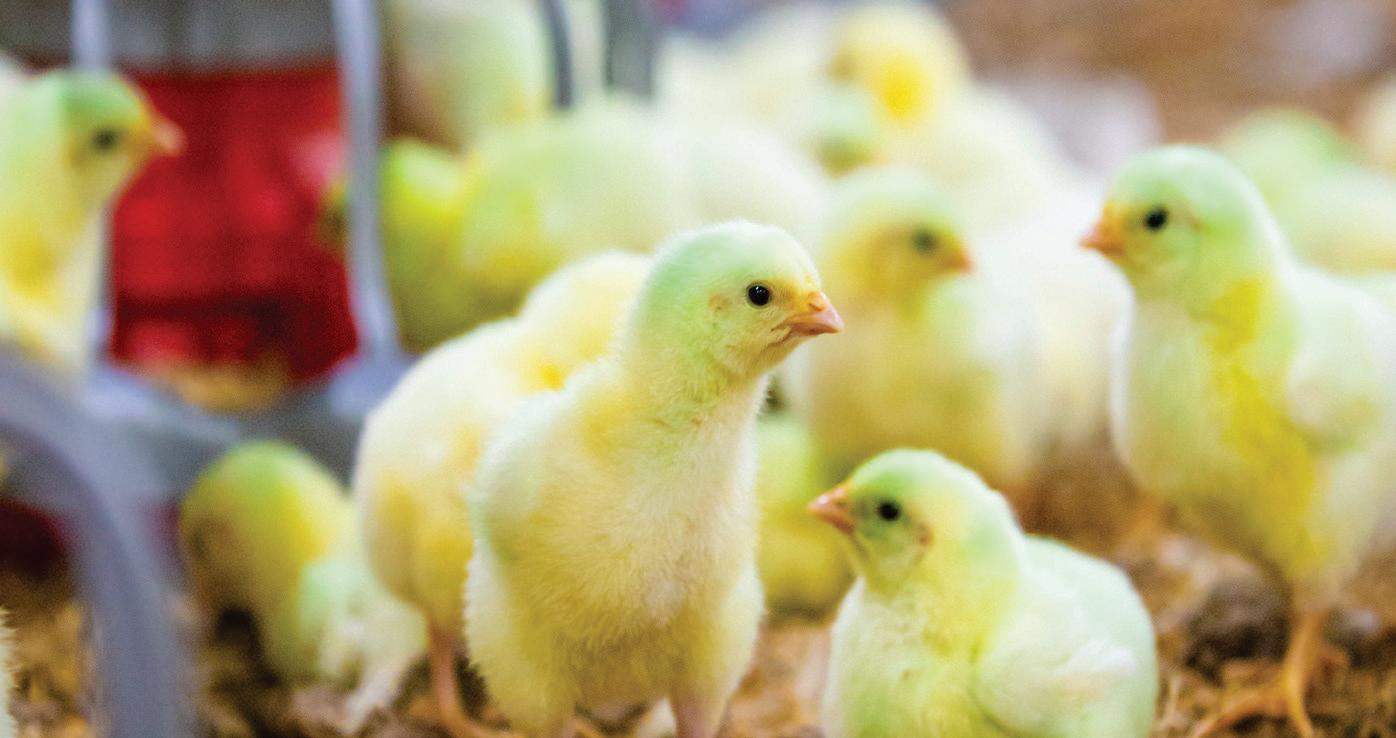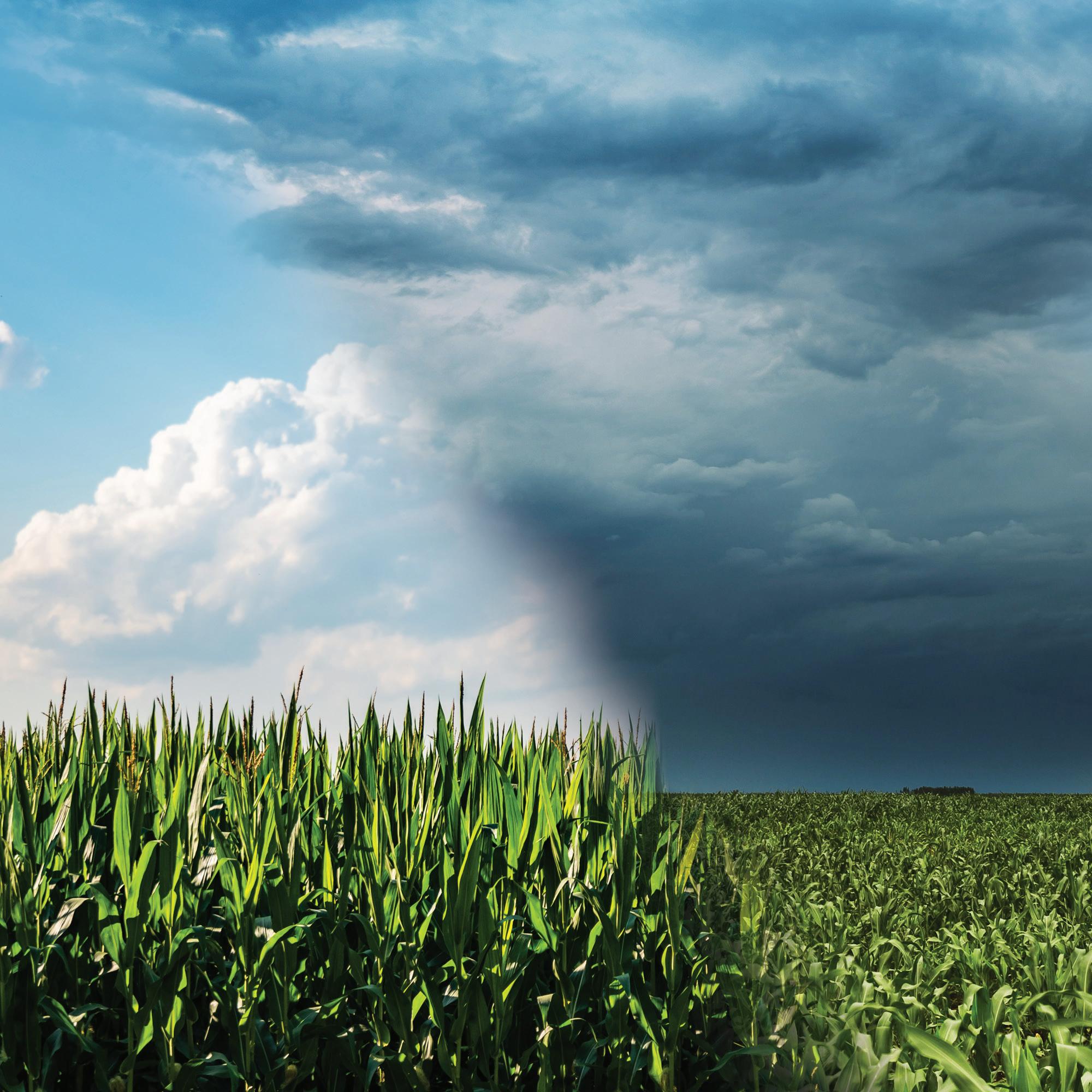
7 minute read
Julie Turner-Crawford The woes of a dry summer
from OFN August 22, 2022
by Eric Tietze
Across The Fence
By Julie Turner-Crawford
Advertisement
The weather has been very, very depressing this summer. It’s been so hot and dry that our typically beautiful Ozarks landscape is somewhat desolate. The only green left around our place are the weeds growing around the shop Julie Turner-Crawford step; everything else is a crispy brown. I’m sure every- is a native of Dallas one else’s places are about the same. County, Mo., where
Then there’s the heat, that miserable heat. As long as she grew up on her there’s some air moving, I can usually get a long OK in family’s farm. She is a the heat, but it’s been like a confection oven this sum- graduate of Missouri mer. I told Bill one recent evening that you know it’s hot when the Jersey is wading into the pond to cool off. Then there are the ants that have invaded my kitchen. When it gets hot and dry, those little pests start searchState University. To contact Julie, call 1-866532-1960 or by email at editor@ozarksfn.com. ing for water and seem to find their way to my house. I’ve thrown anything and everything at them this year, but I think they are only multiplying. My “natural” attempts to rid the pesky creatures from my kitchen have failed, and I have been forced to take a chemical approach. I don’t like doing that in the kitchen, but Bill has learned in recent weeks that there will be very little cooking done during this time and to put nothing on the counters. I might have a handle on them now, but I will not claim victory just yet because I have thought that before.
Bill and I made a couple of evening trips last week, each taking us about an hour and a half away from home. As we drove, the conversation was mainly about the weather and speculation if there had maybe been a little more rain there than at the house. There were

— Continued on Next Page
DESSERTS
Angel Food Cake
Submitted by Rita Yancey, Hagarville, Ark.
• 1 1/4 C sifted cake flour Sift together flour and 2/3 C sugar, twice. Beat • 1 3/4 C sifted sugar egg whites until foamy. Add cream of tarter, salt • • 1 1/2 C egg whites 1 1/2 tsp cream of tarter and vanilla. Continue beating to soft peak stage. Beat remaining sugar (1 C), one tablespoon at a time. Do not overbeat. Add flour and sugar mixture • 1/4 tsp salt in three or four parts, gently folding in with a wire • 1 tsp vanilla whisk, using 12 strokes each time. Pour into a pan. Cut through batter with a spatula to remove large air bubbles. Bake 375 degrees for 40 to 50 minutes. Cool before removing from pan. Note: This recipe was originally my aunt’s, Polly Holben.
Know a Good Recipe? Send in your favorite recipe to share with our readers. Mail them to: PO Box 1514, Lebanon, MO 65536; fax them to: 417-532-4721; or email them to: editor@ozarksfn.com Free Portable Corral Use for Customers • Hauling Available • Covered Pens
Decatur
Livestock Auction Inc.
Serving the Tri-State Area
On Farm Appraisal
Receiving:
Mon.: 8 a.m.-10:00 p.m. Sale: Tues., 12 p.m.
Owners:
Chris Buffer 479-531-2962 Shawn Sperry 479-957-1387 479-752-8499 • Hwy. 59 South • Decatur, AR
Washington County Farmers Mutual Fire
INSURANCE
Company
FARM • HOME • LIABILITY
2209 North Henbest Drive • Fayetteville, Ark. 479-442-2612
washingtonins.net SERVING THE ARKANSAS AREA SINCE 1922
SHOP OUR Tractor Packages & More!& More!
DIY DIGGER
PACKAGE
WEEKEND WARRIOR
PACKAGE
ORDER & SAVE
PROGRAM
1025R Compact Tractor + Loader & Backhoe
RENTAL RETURNS
5E SERIES 3038E Compact Tractor
+ Loader, Rotary Cutter & 18’ Trailer
$500 OFF
ANY 2023 GATOR RETAIL ORDER
LIMITED TIME OFFER
Scan For Savings
Low Hours + Low Financing
Restrictions Apply. See Dealer for Details. Offer Ends 9/17/22.
POLE BARNS
DTConstruction
OK
AR Cov er ing All of Arkansas & Oklahom a




30x40x10 Enclosed ....$14,000 30x50x10 Enclosed ....$15,000 30x50x10 Enclosed with 15’ Shed ...........$19,000 40x60x12 Enclosed ....$23,000 Cow Shed 20x60 9’ Front/7’Back .........$13,200
Custom Sizes/Free Estimates
Colored Metal Available



Call Levi Tincher Today! 918-720-4290
DT Construction Arkansas
Offi ce: 918-489-2724 • PO Box 795, Gore, OK 74435 CHRISTIAN OWNED COMPANY Building Pole Barns for Over 40 Years
Fully Insured with Warranty on Workmanship & Colored Metal
*Due to Covid and the disruption of the supply chain and material price increases there may be a material surcharge added.
Across the Fence
Continued from Previous Page
no lush, green fields; they were all brown. Corn and bean fields looked rough, too.
Thankfully we’ve had some cooler days and rain in some areas, but it has come too late for many folks, and the hot weather has returned. Around our place, we haven’t had enough rain to settle the dust since June. We did get a downpour over the weekend, but it was short-lived.
The water situation for some livestock owners is becoming dire. The recent Drought Monitor index said conditions are just about right for wells to start going dry. Water sources like ponds and creeks are drying up. My dad said he might have to start hauling water to his cows on one farm that has always had a spring creek that provided enough water. It’s down to what he described as a “few mud holes.” One of our neighbors said they have only one pond that has water, and it is getting dry.
Hay production this year is iffy. Some say they are just a little lighter than last year, other say their crop is much less. Either way, it’s not looking good when you are already starting to feed your winter supply. Add a short crop to sky-high production costs, and what hay there is out there is going to be very expensive.
Low livestock prices are always a concern, but we are sure to see a roller-coaster in the coming weeks.
The Ozarks aren’t the only part of the nation experiencing dry conditions and extreme temperatures. According to the National Weather Service, 43 percent of the U.S. and 51 percent of the lower 48 states are in a drought. So far, 229 million acres of crops in the U.S. are experiencing dry conditions.
Many producers are worried about what will happen next and how they will make it through. Farming is hard work, but when you have years like this, it makes things a little trickier.
As the late Dusty Richards said for many years in the pages of OFN, all we need’s more rain
Life Is Simple
Continued from Page 3
When we moved from Arkansas to Missouri in the mid-1950s, we were still milking about 10 cows. Dad’s most productive milk cow was an old Jersey-Angus cross, named, unsurprisingly, Blackie. Through the years, as we transitioned to a beef operation, Blackie’s offspring were continually upgraded, with exceptional Angus bulls, and we ended up with a cowherd that contained the original, whose name had changed to Old Blackie. Also in the herd was Young Blackie, Little Blackie, Big Blackie, Fat Blackie, Skinny Blackie, and at least a half-dozen other descriptive Blackies.
It should be pointed out that one of the few times that Dad ever brought in a female from outside of our herd was during the late 1960s, when the Charolais breed was just gaining popularity. Dad had been to the sale barn and purchased a young Charolais heifer calf to raise into a cow in order to try this new breed that everyone was talking about. As you might expect, Mom and Dad named the new, snow-white, colored calf….Whitey?....no, Charmin.
Before Dad passed away, he had semi-retired enough times that he was down to about five cows on his 10-acre farmette. Diagnosed with inoperative cancer, I helped him load up the last of the cows to take to the auction. As the last old cow made her way onto the trailer, he commented, “You know, that cow right there is Big Blackie’s great-great-granddaughter. Ain’t she a good one?”
She sure was.










